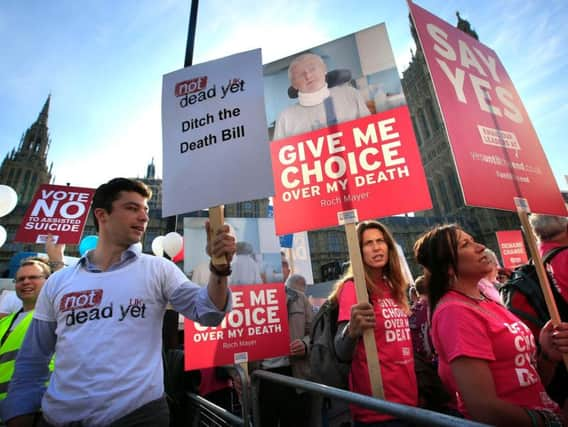Doctors to be asked by Royal College of Physicians for their stance on assisted dying law change


The Royal College of Physicians (RCP) has today revealed that it plans to poll its 35,000 members and fellows next month on whether or not there should be a change in legislation to permit assisted dying.
In the poll on the issue, it will also question members on whether they would also be prepared to “participate actively” in assisted dying if the law was subsequently changed.
Advertisement
Hide AdAdvertisement
Hide AdRCP president Professor Andrew Goddard said the survey, which will be sent out by email next month, was essential if the college was to understand its members’ views.
He said: “The Royal College of Physicians is frequently asked for its stance on this high-profile issue, which may be cited in legal cases and parliamentary debate, so it is essential that we base this on an up-to-date understanding of our members’ and fellows’ views.”
The RCP says it will adopt a neutral position until two-thirds of respondents say that it should be in favour or opposed to a change in the law. It means it will neither support or oppose a change in legislation so it can reflect the differing views of its members and fellows in discussions with the Government and other organisations.
YP Letters: NHS plan will help preserve the nation’s most prized asset, writes Health MinisterAssisted dying remains illegal in the UK and doctors could face a jail term of up to 14 years under the Suicide Act 1961.
Advertisement
Hide AdAdvertisement
Hide AdOpponents of the law change say the legislation exists to protect sick or disabled patients from being exploited or coerced.
Alistair Thompson, from the Care Not Killing alliance that campaigns to protect current assisted dying laws, said: “The current laws on assisted suicide and euthanasia exist to protect those who are sick, elderly, depressed or disabled from feeling obliged to end their lives. It protects those who have no voice against exploitation and coercion.”
The college defines assisted dying as “the supply by a doctor of a lethal dose of drugs to a patient who is terminally ill, meets certain criteria that will be defined by law, and requests those drugs in order that they might be used by the person concerned to end their life”.
Health news: Parents of Leeds toddler with rare condition thank public as USA drug trial continuesThe planned poll will also probe members on what they think the RCP’s position on assisted dying should be.
Advertisement
Hide AdAdvertisement
Hide AdA similar survey by the college five years ago found that a majority of respondents did not support a change in the law.
When the RCP asked members in 2014 whether they would personally be prepared to “participate actively” in assisted dying were it legalised, 58.4 per cent said no. The results were similar to those from a 2006 RCP poll, the college said. There was no majority in 2014 on the question of what the RCP position should be.
The controversial debate surrounding assisted dying was re-ignited last year, when a terminally ill man launched an Appeal Court challenge against the ‘blanket ban’.
Motor neurone disease sufferer Noel Conway, from Shrewsbury, launched a second legal challenge to enlist help from medical professionals to bring about his death in his final six months.
Advertisement
Hide AdAdvertisement
Hide AdHowever, the retired lecturer was last month refused permission by the Supreme Court to challenge the law on assisted dying.
He told of how he was “bitterly disappointed” and “bewildered” by the decision.